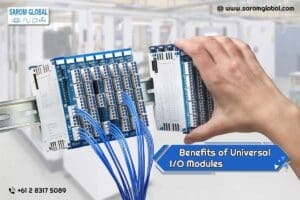 The Io modules for IoT Applications are revolutionising industrial manufacturing which demands higher productivity. Companies need easy solutions that enable agility in their operations – all at the touch of a button – as they fight to get their products to market faster and cheaper.
The Io modules for IoT Applications are revolutionising industrial manufacturing which demands higher productivity. Companies need easy solutions that enable agility in their operations – all at the touch of a button – as they fight to get their products to market faster and cheaper.
Machine builders need goods that are simple to use, instal, and maintain because they don’t have the time or funds for specialised tools or pricey, highly skilled engineers and electricians. Our necessity is driving a trend in industrial automation known as “plug-and-produce,” as you may have read in this previous blog article about the Smart Factories of the Future.
How is Plug and Produce Impacting Smart Manufacturing Industrial Factories?
To grasp it, consider the term “plug-and-play,” which you’re probably already familiar with. A plug-and-play product, as the name implies, can simply be plugged in and switched on, and it will function. It carries the expectation of ease of use as well as dependable, error-free performance. The term plug-and-produce was used to describe the practical extension of plug-and-play items when used across an entire industrial plant.
Many networking and connection companies are adapting their devices to plug-and-produce concepts. Machine builders will reap numerous direct benefits now that they have access to a wider range of prospective items and solutions.
Universal input/output (I/O modules) modules are one such product. Universal I/O modules are critical for creating networks that work in the modern plug-and-produce environment. It not only makes the life of machine manufacturers easier, but it also has a direct financial impact. It’s especially useful for machine builders who are limited by space or price, or who need more power and performance.
Universal IO Modules’ Benefits for Smart Factories and Machine Building
Such universal IO modules are required to make the goal of plug-and-produce a reality. Let’s take a look at the impact these I/O modules will have on machine builders, as well as the four major benefits they will provide:
Less Complexity
The ideal I/O module is one that is really global. It enables the usage of current or older machine designs while also facilitating future upgrades. Inputs and outputs are not required for universal IO modules for IoT. Because you can buy a module with as many inputs or outputs as you need, rather than the standard 8 inputs and 8 outputs, you can adjust the module to your needs rather than the other way around.
Additional adapters will be included with a plug-and-produce-ready I/O module. This enables machine builders to not only purchase modules with the features they require but also to change their minds and fit new applications without having to drill new mounting holes.
Improved Inventory
Using a universal I/O module allows you to stock fewer product kinds and variants, resulting in a more streamlined supply chain. Machine builders can keep a single module on hand and alter it for a variety of uses. The bit mapping between the physical ports of the module and the logical representation is contained in the right I/O module.
This means that the mapping length can be customised in any way to be interchangeable with any machine module. As a result, if the software in an I/O module is compatible with the software in all other modules on the system, there is no need for several I/O modules, and inventory is simplified. Furthermore, with fewer device kinds to stock, spare parts storage space is reduced.
Global Use of IO Modules
Universal I/O modules should meet the industry protocols for global and regional applications. Machine builders for worldwide operations are trapped replacing I/O modules on machines to fulfil country-specific or protocol-specific requirements without this capability. There are several product versions to consider, as well as a long and complicated supply chain. However, functioning globally is simple with the correct I/O module that complies with a variety of industrial protocols.
Better Impact on the Bottom Line
Customers don’t have to spend time and money educating staff on new modules since I/O modules are more versatile and easy to customise. Machine manufacturers can help their customers achieve greater overall efficiency and cost savings by providing fewer parts to train on, easier module replacements, and less downtime.
Furthermore, instead of constantly acquiring new io modules for IoT applications to satisfy changing needs, the flexibility to use one module has a favourable influence on the bottom line.
These advantages demonstrate the importance of universal I/O modules in the new plug-and-produce machine-building environment. Machine builders can simplify operations and save money by finding the correct I/O modules, effectively accomplishing more with less.
Contact us
SAROM GLOBAL
info@saromglobal.com
